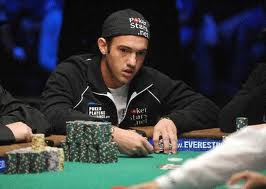Poker Raid Destroys Pros' Livelihoods
 The Wall Street Journal reports:
The Wall Street Journal reports:
The U.S. government disrupted the weekend—and life—plans of Cory Albertson and thousands of others like him who earn much of their living playing poker online.
For nearly eight years, Mr. Albertson has camped out every Sunday on his couch with his laptop to play No Limit Hold'Em with thousands of other online players at PokerStars or Full Tilt Poker. He might pocket $500 for the day, or lose money, but sometimes he'd win big, as much as $75,000 at a time, adding a nice sum to his income as a freelance writer in Austin, Texas.
The U.S. Justice Department announced Friday it was blocking players in the U.S. from accessing Full Tilt Poker, along with other online poker sites, accusing 11 people of bank fraud and of illegally operating gambling websites. The government seized accounts run by the sites that held money stored by players.
The crackdown came after years of tension between the sites and the U.S. government, which long held that online gambling is illegal. The case could test the claim by the poker site operators that operating a poker site online isn't illegal because, they say, as a game that involves skill, poker is not gambling.
The government action shined a light on a game that had become a vocation for thousands of Americans and pastime for millions of casual players. Online poker has spawned an industry of celebrity players, bloggers, coaches and television shows sponsored by the sites now charged with criminal activity.
"We understood there were issues," said Jonathan Wein, a professional poker player who runs a business teaching poker online. "We never assumed there'd be some type of black-out overnight."
Congress passed a law in 2006 that forbid financial institutions from processing financial transactions related to online gambling. That made it much more difficult for websites to accept money from players and pay them back.
Many sites left the U.S after the law passed. Others, namely Full Tilt Poker and PokerStars, built lucrative businesses by catering to U.S. players from overseas. PokerStars is based in the Isle of Man, Full Tilt is regulated by Alderney in the U.K.'s Channel Islands and Absolute Poker, another site, is in Costa Rica.
The approach seemed to work, allowing the sites to build a market that last year included about 1.8 million people in the U.S. who played poker online for money, according to PokerScout, which tracks online poker site data. Other organizations say there are many more players.
The sites saw around $16 billion in wagers from U.S. players last year, with the bulk of that taken in by Full Tilt Poker and PokerStars, according to PokerScout.
Click here to read more.

